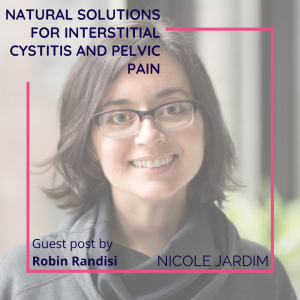Written by my Spring 2017 apprentice, Robin Randisi, this post discusses how to overcome interstitial cystitis and pelvic pain!
Have you ever gotten a UTI that had you running to the bathroom every 15 minutes? A few years ago that was me, pretty much every day.
I remember it vividly: scoping out every public bathroom on my walk to and from the subway. Casing the joint as soon as I arrived somewhere new in order to locate the nearest restroom. And of course, the constant and incredibly painful urge to pee.
Except I didn’t have a urinary tract infection. That’s right – what I had was a chronic condition that feels like a UTI that never goes away! It’s called interstitial cystitis.
Interstitial Cystitis
Interstitial cystitis (IC) is also known as painful bladder syndrome, and as many as 12 million women in the U.S. are estimated to have it. Although men suffer from IC as well, the vast majority of those diagnosed are women. Unlike a UTI, bacteria in the bladder or urinary tract are not the culprits behind interstitial cystitis. More on that in a bit.
The primary symptoms of interstitial cystitis are:
- abdominal or pelvic pain
- urinary urgency and frequency, including throughout the night
- feelings of pressure in the abdomen or pelvis
- partial relief upon emptying the bladder
Symptoms can vary widely in type and intensity, but almost everyone with interstitial cystitis experiences some amount of pain. In fact, the pain associated with IC can be so debilitating that only about half of people with the disorder are able to work full-time.
In addition to pain, my experience with IC also included bloating, achy joints and muscles, and fatigue. But the worst part was how isolated and uncertain I felt. My doctor gave me antibiotics, which only left me in worse shape than before I took them. And when I went back to her for more help, she dismissed my concerns, offered to write me a prescription for antidepressants, and then sent me home.
Antidepressants were not the fix I was looking for. After enduring months of pain, I just wanted to feel like myself again, but I knew the answer wasn’t prescription drugs.
A Holistic Approach To Treating Interstitial Cystitis
I became determined to heal and believed that if I understood what was happening to my body, I could try to fix it. And I quickly realized that, aside from pain medication and invasive procedures, conventional medicine didn’t have much to offer when it came to truly resolving IC.
So I turned to natural treatments and embraced a more holistic perspective, specifically that of functional medicine, which addresses the root cause of symptoms and focuses on supporting the body’s innate capacity to heal itself.
Seen through a functional lens, interstitial cystitis was just a manifestation of deeper dysfunction within my body—a cry for help—and it was my job to correct the underlying systemic imbalances that had caused it.
In interstitial cystitis, the lining of the bladder is inflamed or irritated. But why does that happen in the first place? According to Wendy Cohan, author of The Better Bladder Book, potential triggers of IC and other pelvic pain disorders include:
- An autoimmune response
- Stress or trauma
- Problems with the pelvic floor
- Neurogenic inflammation, or inflammation in the body that is triggered by the nervous system
- Occult infections like Lyme disease, Bartonella, Chlamydia pneumoniae, or Enterococcus
- Gastrointestinal issues like leaky gut, dysbiosis, celiac disease, and non-celiac gluten sensitivity
From a holistic and functional perspective, the root cause of interstitial cystitis is different for each individual, and there could even be multiple root causes at play. But the good news is that even with a complex and chronic condition like IC, there are plenty of things you can do to help your body heal naturally.
It Begins With The Gut
Our digestion and what we consume has a profound effect on our urogenital system, not to mention the rest of the body. Patients who receive a diagnosis of interstitial cystitis are often told to follow the IC diet, which removes common bladder irritants like citrus, caffeine, chocolate, and alcohol. Although it’s a good place to start, many people find the IC diet to be woefully inadequate when it comes to resolving their symptoms.
I know that was true for me. Personally, I had to make dietary changes well beyond the standard IC diet in order to jumpstart my healing process, but as soon as I did, the improvement I experienced was drastic. I also worked on healing my gut—which, after all, is where an astounding 60-70% of the immune system is located.
Interestingly, IC is increasingly considered an autoimmune disorder, meaning my symptoms could’ve been a result of my immune system going haywire and attacking my own bladder tissue as if it were a foreign invader. Autoimmunity is closely connected to the health of the digestive tract; it’s been linked to increased intestinal permeability (often referred to as “leaky gut”), so it’s no surprise that healing from interstitial cystitis starts with diet.
Natural Treatments for Interstitial Cystitis
There are many natural and alternative treatments for interstitial cystitis worth exploring, but these are where I recommend starting:
- Removing gluten, dairy, sugar, and soy from the diet
- Adopting a low-oxalate, low-histamine, and/or low-lectin diet
- Identifying and removing any food sensitivities
- Neutralizing urine pH
- Addressing nutrient deficiencies like vitamin D, magnesium, omega-3 fats, and B vitamins (get your levels tested at Lets Get Checked)
- Medicinal herbs like linden flower, ashwagandha, boswellia, chamomile, marshmallow root, nettles, and slippery elm bark
- Pelvic floor physical therapy
- Stress reduction and relaxation techniques
- Supplements like L-glutamine and MSM
- Treating gut infections such as SIBO or candida overgrowth, or occult infections like Lyme disease, if present
I certainly tried a bit of everything when I was sick, but I believe the changes that I made to the food I ate had the most profound impact on my healing. Things shifted almost immediately when I adopted an anti-inflammatory diet.
For me, that meant giving up processed food and removing all grains, legumes, sugar, and dairy from my diet. I also started eating high-quality animal protein again after many years of being vegetarian, in addition to incorporating specific herbs and supplements into my routine.
Within a month, I was functioning like a normal human being again, and in a few more months, my symptoms were totally gone. In fact, I realized I was feeling even better than I had before I got sick!
If you or someone you know is suffering from IC or chronic pelvic pain, I believe there’s hope for you. My own story is proof of that, and it’s what fuels the nutrition counseling I do with my clients every day.
About Robin:

Robin Randisi is a certified Nutritional Therapy Practitioner in private practice in New York City, where she provides functional nutrition counseling to clients in-person or by video chat. Robin is committed to helping people address the underlying issues behind their health concerns, and she especially enjoys working with women with interstitial cystitis, hormonal issues, or autoimmune diseases.
You find her at www.robinrandisi.com and on Instagram and Facebook.




13 thoughts on “Natural Solutions for Interstitial Cystitis and Pelvic Pain”
I have basically been diagnosed with I c and have been on a fruits and veggies diet and olive oil and almond butter and nothing else. I have not been eating tomatoes or acidic fruits or veggies. I have been in this diet for a month now and do not see much change at all. What do you think this means for me? Will the diet not help certain people who have I c and why?
have you ever heard about ausilium nac by deakos? Please share your experiences
Marshmallow root helped me treamondesly and aloe Vera from by pharm-aloe , I take them both and pain gotten a lot better and it’s only been a few days . Also drink tea to make u sleep at night like camellia tea
Hi Jacky can you please tell me where you got the items you listed like the marshmallow sugestión? Thanks
were you ever tested for Ureaplasma bacteria?
i have ecoli and cystitis related with sex
How is it related with sex? I’m really need to know. Everytime my husband and I have sex it seems I end up in pain or a uti
i mean sex is my trigger :(((((((((((((((((((
hello, i hace e.coli and suffer from postcoital cystitis
Hello Robin, I have Interstitial Cystitis but according to my urologist I don’t have it. I don’t have an inflamed bladder. But Ihave all the symptoms of IC. I could have a nerve problem. After reading your article, I will have to cut off soy drinks. What do you suggest to make my constant peeing especially at night less stressful.
Hello, I was hoping you could tell me which herbs you started taking.
I’m wondering, did you have to continue with the diet long-term in order to maintain good bladder health? Or did it heal and you were able to go back to some regular foods afterwards?
I was diagnosed with IC 3 months ago. I’v been on an anti inflammatory diet, as well as eliminating foods after a food intolerance test, 2 months ago. I can tell I’m sloooowly improving but not as quickly as you did or my naturopath expected. It seems the main difference is supplements. He has me taking a few homeopathic tinctures, probiotics and magnesium. Can you please tell me what supplements you took? I worry that I’m missing something to actively heal. My diet is very clean but something is missing. Thx!